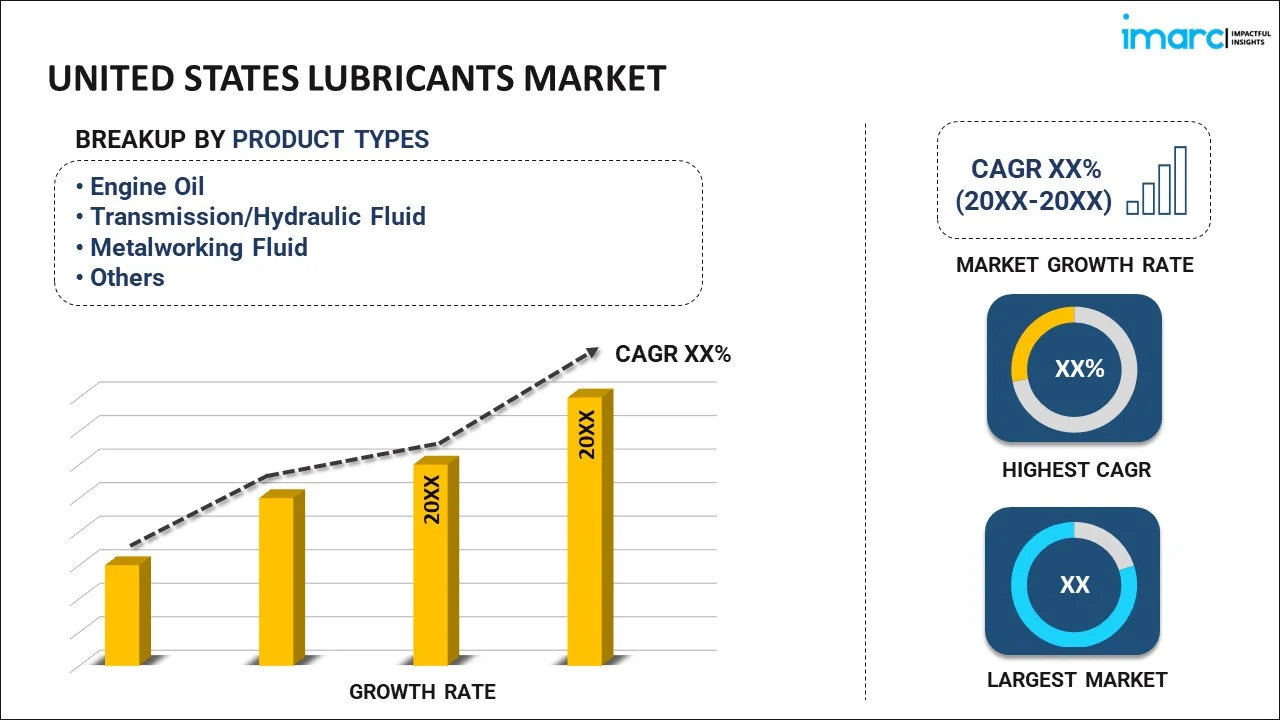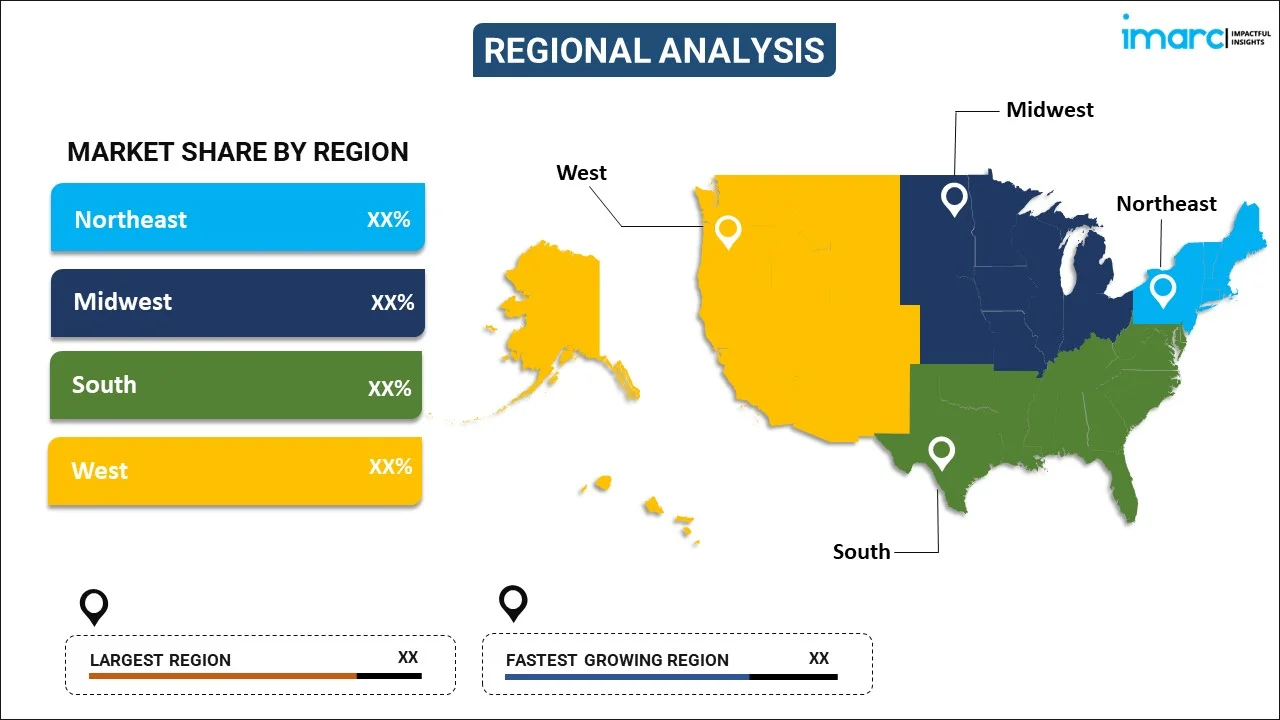
United States Lubricants Market Report by Product Type (Engine Oil, Transmission/Hydraulic Fluid, Metalworking Fluid, General Industrial Oil, Gear Oil, Grease, Process Oil, and Others), Base Oil (Mineral Oil, Synthetic Oil, Bio-Based Oil), End Use Industry (Power Generation, Automotive and Other Transportation, Heavy Equipment, Food and Beverage, Metallurgy and Metalworking, and Others), and Region 2025-2033
Market Overview:
United States lubricants market size reached USD 32.6 Million in 2024. Looking forward, IMARC Group expects the market to reach USD 41.9 Million by 2033, exhibiting a growth rate (CAGR) of 2.9% during 2025-2033. The escalating advances in lubricant technology, including the development of high-performance synthetic lubricants, which contribute to increased efficiency and extended equipment life, are driving the market.
|
Report Attribute
|
Key Statistics
|
|---|---|
|
Base Year
|
2024
|
|
Forecast Years
|
2025-2033
|
|
Historical Years
|
2019-2024
|
|
Market Size in 2024
|
USD 32.6 Million |
|
Market Forecast in 2033
|
USD 41.9 Million |
| Market Growth Rate 2025-2033 | 2.9% |
Lubricants are substances designed to reduce friction between moving surfaces, enhancing the efficiency and longevity of machinery. Comprising oils, greases, and other specialized compounds, lubricants form a protective layer that minimizes wear and tear, dissipates heat, and prevents corrosion. In industrial, automotive, and aerospace applications, lubricants play a crucial role in maintaining optimal performance and preventing equipment failure. They are formulated with base oils and additives to meet specific requirements, such as temperature resistance, viscosity, and load-bearing capacity. Lubricants find application in engines, gearboxes, bearings, and various mechanical components. Regular lubrication schedules are essential for machinery maintenance, ensuring smooth operation, reduced energy consumption, and extended equipment lifespan. The development of advanced synthetic lubricants continues to push the boundaries of performance, addressing environmental concerns and enhancing overall efficiency in diverse sectors.
United States Lubricants Market Trends:
The lubricants market in the United States is experiencing robust growth, primarily driven by several key factors. Firstly, the increasing demand for automobiles has propelled the need for efficient lubricants, given their crucial role in minimizing friction and enhancing engine performance. Moreover, the growing industrialization in the United States has significantly boosted machinery production, further stimulating the demand for high-quality lubricants to ensure smooth operations and extend equipment lifespan. Additionally, stringent environmental regulations have spurred innovation in lubricant formulations, fostering the development of eco-friendly and bio-based lubricants that align with sustainability goals. Furthermore, the expanding aerospace and marine sectors are contributing to the escalating demand for specialized lubricants designed to withstand extreme conditions, such as high temperatures and pressures. Technological advancements, including the rise of synthetic lubricants with superior performance characteristics, are also influencing market dynamics positively. As industries become more aware of the economic benefits associated with preventive maintenance, the adoption of lubricants as an integral part of machinery upkeep is on the rise. In conclusion, a confluence of factors, including automotive growth, industrialization, environmental concerns, technological innovations, and sector-specific demands, collectively propels the flourishing lubricants market in the United States.
United States Lubricants Market Segmentation:
IMARC Group provides an analysis of the key trends in each segment of the market, along with forecasts at the country level for 2025-2033. Our report has categorized the market based on product type, base oil, and end use industry.
Product Type Insights:

- Engine Oil
- Transmission/Hydraulic Fluid
- Metalworking Fluid
- General Industrial Oil
- Gear Oil
- Grease
- Process Oil
- Others
The report has provided a detailed breakup and analysis of the market based on the product type. This includes engine oil, transmission/hydraulic fluid, metalworking fluid, general industrial oil, gear oil, grease, process oil, and others.
Base Oil Insights:
- Mineral Oil
- Synthetic Oil
- Bio-Based Oil
A detailed breakup and analysis of the market based on the base oil have also been provided in the report. This includes mineral oil, synthetic oil, and bio-based oil.
End Use Industry Insights:
- Power Generation
- Automotive and Other Transportation
- Heavy Equipment
- Food and Beverage
- Metallurgy and Metalworking
- Others
The report has provided a detailed breakup and analysis of the market based on the end use industry. This includes power generation, automotive and other transportation, heavy equipment, food and beverage, metallurgy and metalworking, and others.
Regional Insights:

- Northeast
- Midwest
- South
- West
The report has also provided a comprehensive analysis of all the major regional markets, which include Northeast, Midwest, South, and West.
Competitive Landscape:
The market research report has also provided a comprehensive analysis of the competitive landscape. Competitive analysis such as market structure, key player positioning, top winning strategies, competitive dashboard, and company evaluation quadrant has been covered in the report. Also, detailed profiles of all major companies have been provided.
United States Lubricants Market Report Coverage:
| Report Features | Details |
|---|---|
| Base Year of the Analysis | 2024 |
| Historical Period | 2019-2024 |
| Forecast Period | 2025-2033 |
| Units | Million USD |
| Scope of the Report | Exploration of Historical Trends and Market Outlook, Industry Catalysts and Challenges, Segment-Wise Historical and Future Market Assessment:
|
| Product Types Covered | Engine Oil, Transmission/Hydraulic Fluid, Metalworking Fluid, General Industrial Oil, Gear Oil, Grease, Process Oil, Others |
| Base Oils Covered | Mineral Oil, Synthetic Oil, Bio-Based Oil |
| End Use Industries Covered | Power Generation, Automotive and Other Transportation, Heavy Equipment, Food and Beverage, Metallurgy and Metalworking, Others |
| Regions Covered | Northeast, Midwest, South, West |
| Customization Scope | 10% Free Customization |
| Post-Sale Analyst Support | 10-12 Weeks |
| Delivery Format | PDF and Excel through Email (We can also provide the editable version of the report in PPT/Word format on special request) |
Key Questions Answered in This Report:
- How has the United States lubricants market performed so far and how will it perform in the coming years?
- What has been the impact of COVID-19 on the United States lubricants market?
- What is the breakup of the United States lubricants market on the basis of product type?
- What is the breakup of the United States lubricants market on the basis of base oil?
- What is the breakup of the United States lubricants market on the basis of end use industry?
- What are the various stages in the value chain of the United States lubricants market?
- What are the key driving factors and challenges in the United States lubricants?
- What is the structure of the United States lubricants market and who are the key players?
- What is the degree of competition in the United States lubricants market?
Key Benefits for Stakeholders:
- IMARC’s industry report offers a comprehensive quantitative analysis of various market segments, historical and current market trends, market forecasts, and dynamics of the United States lubricants market from 2019-2033.
- The research report provides the latest information on the market drivers, challenges, and opportunities in the United States lubricants market.
- Porter's five forces analysis assist stakeholders in assessing the impact of new entrants, competitive rivalry, supplier power, buyer power, and the threat of substitution. It helps stakeholders to analyze the level of competition within the United States lubricants industry and its attractiveness.
- Competitive landscape allows stakeholders to understand their competitive environment and provides an insight into the current positions of key players in the market.
Need more help?
- Speak to our experienced analysts for insights on the current market scenarios.
- Include additional segments and countries to customize the report as per your requirement.
- Gain an unparalleled competitive advantage in your domain by understanding how to utilize the report and positively impacting your operations and revenue.
- For further assistance, please connect with our analysts.
 Request Customization
Request Customization
 Speak to an Analyst
Speak to an Analyst
 Request Brochure
Request Brochure
 Inquire Before Buying
Inquire Before Buying




.webp)




.webp)












